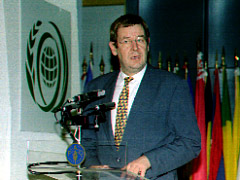


DENMARK - DANEMARK - DINAMARCA | ||
His Excellency Poul Nyrup Rasmussen, Prime Minister of Denmark | ||

I of course share the views and fully endorse the intervention by my colleague, the Prime Minister of Ireland on behalf of the European Union a short while ago. I have chosen to attend this Summit because of the gravity of the problem we are facing. Even as we speak people are suffering and dying from hunger and related diseases the world over. I find that the first object of this Summit is, therefore, to attract attention to the problem. The second object of this Summit is to do something about it. In pure terms, our analysis shows there is food enough to feed the present world population. The immediate problem is access, the cause is poverty. Remember that poverty was one of the three main objects and topics of the World Summit on Social Development in Copenhagen last year. Already then, we committed ourselves to an unprecedented effort to eradicate poverty in the world. Neither the Copenhagen nor the Rome Summit will be able to do it alone, nor will FAO. I think it is fair to say that an integrated approach to follow-up is absolutely essential. In accordance with established United Nations practice, I therefore propose to make food security the subject of the high level segment of an ECOSOC session as soon as possible. Mr. Chairman, my good friends and colleagues, hunger is not an inevitable condition of man, it is something we can do something about. Our Declaration rightly commits us to reduce the number of undernourished people to half their present level in less than 20 years. It is a tremendous commitment, the responsibility to fulfil it lies mainly with national governments, including the governments of the most severely affected countries. And here I want to say that democracy, respect for human rights and good governance are essential preconditions for creating a predictable and secure environment for food producers and thus to achieve food security. Many, many governments to tell the truth, have still a long way to go to meet this responsibility and I am inclined today to mention just two concrete examples which should be met: · Firstly, women are discriminated against in many countries. In short, improving conditions for rural women is essential to achieve food security; · Secondly, only farmers and fishermen, not governments can secure our supply of food. In short, governments must encourage the active participation of farmers in civil and local society. We have so many experiences of how to do it and integrate responsibility and ability in local society. But even with the best efforts, the least developed countries are not likely to succeed without international assistance, without assistance from the richer part of the world. In this context I find it disappointing, and I underline disappointing to say the least, that most industrialized countries do not meet the United Nations' target of 0.7 percent of GNP as Official Development Assistance. It is disappointing and it is unacceptable - it is hard to accept - that Official Development Assistance decreases while malnutrition and hunger increases. I feel that it is time to underline that the nice words should be followed by concrete actions. As far as my country is concerned, Denmark spends more than 1 percent of GNP on development assistance and we give top priority to rural development and to agriculture. With the world's population increasing dramatically over the next decades meeting our commitments requires a substantial increase in food production. This must be achieved in such a way as not to compromise the ability of future generations to meet their needs in turn. This is the essence, indeed the definition of sustainability. Our Declaration commits us to pursue sustainability, but we still need to develop a common understanding of this concept in order to transform the plan into concrete actions. In this context, increased food production also needs to take into account traditional skills and experiences of rural and indigenous peoples. Let me end by stressing that war creates large numbers of refugees plagued by diseases and hunger. We cannot meet today without mentioning the humanitarian disaster unfolding in Central Africa right now. Denmark, my country, is a major contributor to the international humanitarian effort to relieve the situation. Relief is necessary and urgent. In the long run, prevention may be even more important. By focusing on food security and by adopting the Rome Declaration and Plan of Action, I hope this Summit will become a stepping stone for future action and a necessary element in the long-term efforts of the international community to promote peace and development. | ||
|
|
|
|

 |